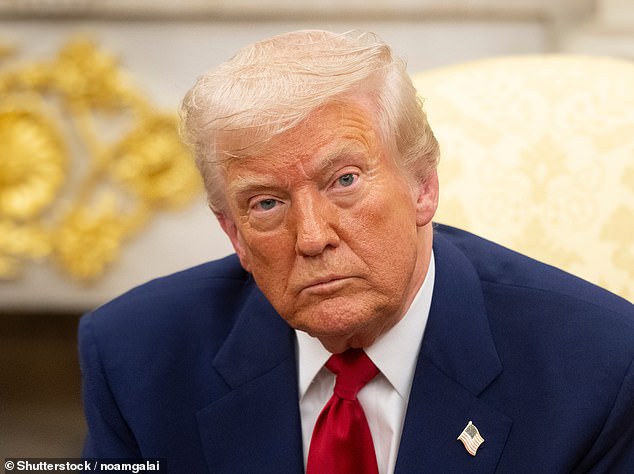Maybe the financial markets are right about Donald Trump’s tariff war not being too damaging to the global economy – and the naysayers warning of a collapse are going to be proved wrong.
The big equity markets have recovered the ground they lost in the days after the US President’s ‘liberation day’ on 2 April.
America’s S&P 500 index has risen 14 per cent from its April lows, though it is still down on the year.
The Footsie is now up 15 days on the trot, 4 per cent higher than on January 2, while the German Dax has recovered to within a couple of per cent of its all-time high.
There are two messages here. One is that big American businesses are showing themselves to be extraordinarily resilient.
The other is that it looks like quiet negotiations between the various players will ensure the most important elements of world trade are preserved – and maybe, just maybe, we will end up with a more durable form of globalisation than we had before.

Proved wrong: Maybe the financial markets are right about Donald Trump’s tariff war not being too damaging to the global economy
There are all sorts of examples of big tech resilience. One came from Apple. It is moving most of the assembly of its iPhones from China to India. Clear message there for the Chinese authorities.
Another was from Microsoft, which reported better-than-expected profits, and whose market capitalisation shot up 10 per cent.
Meta Platforms – Facebook, WhatsApp, Instagram and so on – also saw its shares recover.
As for the moves to stop tariffs destroying global trade, the most significant one was the news that China had quietly dropped its retaliatory tariffs on a quarter of its imports from the US, including pharmaceuticals, aerospace equipment and semi-conductors.
The politicians will go on posturing but the grown-ups are winning the argument.
After all, anyone at the top of a global corporation is used to dealing with difficult governments. These entrepreneurs and executives know they will be there, or at least their companies will still be operating, long after the politicians of the day have been ousted.
There was a spat between Jeff Bezos and Trump the other day after a report that Amazon was thinking of including a separate item for the cost of tariffs on its posted prices.
Cue White House fury, with press secretary Karoline Leavitt saying it was a hostile, political act. Amazon denied it was a serious proposition.
A phone call took place between Bezos and Trump, after which the President said that the head of Amazon was ‘a good guy’.
So Amazon bowed to pressure? Look, Bezos is 61 and worth $212 billion on the Bloomberg Billionaires Index. Donald Trump is 78, and doesn’t even make the cut.
His wealth is estimated by Forbes at $5.1 billion – huge of course, but not in the top 500 on the global wealth count. And which of the two will be around in ten years’ time?
As far as tariffs go, trade will continue. World trade needed reform, because many countries, including China and, let’s not forget, the members of the European Union, have twisted a supposedly free trade system to gain advantage for their own producers.
Is this blitz of tariffs by the US the best way of getting reform? Probably not, because smaller enterprises and countries get hurt in ways that can’t be predicted and will inevitably be unfair.
For Jaguar Land Rover, trying to sell cars to California, it’s rough. It has had to pause exports to the US. But its parent, India’s Tata Group, may end up being a net beneficiary from the tariff war if, for example, it has better access to the US for software exports. There had to be reform and this one way of getting it.
Disruption is never good for an economy, and there is plenty of that here in the UK right now. On top of the trade stuff have come all the regulations and tax rises from this Government.
But what is happening is nothing on the scale of the disaster that swept across the world as a result of the pandemic and the shut-down in response to that.
Businesses, large and small, managed to cope. The markets are saying they will cope now.
If they are right, there will indeed be some sort of mid-cycle slowdown, but a more robust world economy at the end of it.
DIY INVESTING PLATFORMS

AJ Bell

AJ Bell
Easy investing and ready-made portfolios

Hargreaves Lansdown

Hargreaves Lansdown
Free fund dealing and investment ideas

interactive investor

interactive investor
Flat-fee investing from £4.99 per month

InvestEngine

InvestEngine
Account and trading fee-free ETF investing
Trading 212
Trading 212
Free share dealing and no account fee
Affiliate links: If you take out a product This is Money may earn a commission. These deals are chosen by our editorial team, as we think they are worth highlighting. This does not affect our editorial independence.
This article was originally published by a www.dailymail.co.uk . Read the Original article here. .

